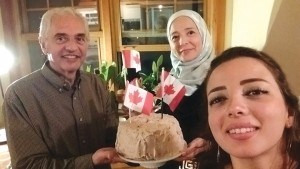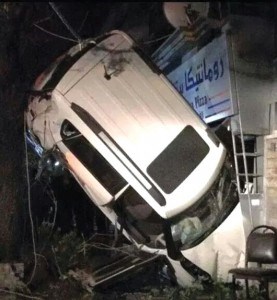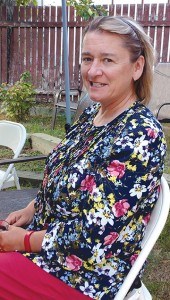
Just over a year after leaving Syria to start a new life in Jasper, Reham Al Azem shared her story about the events that led her family to flee her war-torn country and her first 12 months in Canada.
It’s been one year since I arrived in Canada as a refugee from Syria. I have been reflecting a lot about the past 12 months wondering whether our decision to immigrate to Canada was the right thing to do. To answer that question it’s important to first understand what I left behind.
Syria is a great country, but unfortunately Syria is not Syria anymore. It’s a place of war and corruption. The chaos and bloodshed forced us to leave everything behind and start from scratch. Like so many other families in Syria, we suffered a lot. There was a lack of jobs, electricity was limited, cooking gas was sparse and heat for our home was difficult to come by. A corrupt legal system became the norm, as did the arrests of innocent friends and family members, not to mention the fear of bombs. I remember the sound of rockets and knowing that when the sound ended, it meant people had died.
In other words, it was a frog’s life; the frog which is slowly being boiled alive. If a frog is put suddenly into boiling water, it will jump out, but if the frog is put in cold water, which is then brought to a slow boil, it will not perceive the danger and will be cooked to death. That was our life in Syria.
The moment I decided to stop being a frog was when I saw the blood on the face of the most valuable person in my life–my mother. In February 2015 my mother and I were eating in a café in the capital Damascus when a car crashed through the front window nearly killing her.
It was terrible car accident in which one man was injured and almost lost his leg. It was a miracle my mother survived. The speeding driver immediately fled and despite many witnesses, he was never charged. In fact, the police accident report was changed and people said the patrolman was bribed. The government-supported militia also came to support the driver’s family. They told people not to reveal the identity of the driver. As Syrians we knew that whenever the militia were present, we must do what they say, regardless of the law or people’s rights. It was a classic example of the corruption and influence of the government militia in Syria at the time.

As a lawyer and someone who was affected by the accident, I tried to sue in court and have the driver brought to justice. But I was not supported by the legal system nor the witnesses. While more than 30 people saw the accident no one agreed to come to court. They were afraid of the militia. The judge said that the only evidence he could use in his decision was the police report, which had been altered. My other options were equally unjust such as exaggerating the medical injuries to my mother, lying about what I had witnessed, or hiring a witness to lie for us. While these are very common tactics in Syria, especially during the chaos of the war, how could we put our hands on the Qur’an and lie in court, or cause someone else to perjure themselves? It seemed, in Syria, the sound of money was louder than the sound of human rights.
Since then I have learned that a peaceful place is not where you have family or a job or own a house, peace is where you can defend your rights if there is threat to them. But that was no longer possible in Syria. Not only were we living in a war zone, we were also living with a corrupt justice system. From that moment on, my parents and I decided to leave the country rather than wait and risk our lives.
But where to go? A new friend we met in Lebanon told me about organizations in Canada who were helping refugees. I sent emails to organizations in Ontario and Alberta, and asked them how we could come to Canada. My friend introduced me by email to Gail Millard, the refugee coordinator for the Anglican Diocese of Edmonton. Gail dedicates her life to helping refugees. I remember I told her that I wanted to get my parents to a safe place and needed support for our first year in Canada. I doubted I would receive any serious response until my inbox starting filling up with messages from Nancy Addison, a local Jasperite.
For reasons unbeknownst to us, Addison chose us from a list of other refugees also seeking asylum. With limited resources, Jasper managed to raise enough money to sponsor two Syrian families, one of them being my family. It was as if we had won some sort of lottery.
Addison organized the whole process to get us here. As a member of the Anglican Church in Jasper, she arranged meetings with people in the community to prepare all the government documents and a place to live. She also followed up with me frequently. Each email asked me if I needed anything and told me to be patient until we got the approval to come to Canada. We now know that Addison and Millard weren’t just helping us, they were helping others too.

Our flight left Lebanon on February 22, 2016. We were part of 25,000 refugees Prime Minister Justin Trudeau had promised to resettle in Canada. I remember when I landed at Pearson International Airport in Toronto and stepped into the hall. There were a lot officials standing beside each other, trying to pronounce “marhaba” which is “hello” in Arabic, to make the refugees feel welcome. I still have a letter from the premier of Ontario, Kathleen Wynne, which was given to each refugee to welcome us to Canada.
After that the official in the airport told us “you will receive your permanent resident card in four to six weeks.” I was surprised and I thought that I had not understood him correctly and asked him if he meant we would be permanent residents after that period. He answered me “No ma’am, you are a permanent resident from this moment and your rights in Canada are the same as my rights, except for voting.”
I thought he was kidding! We also received an apology that the hotel might not meet our expectations. However, when we arrived at the hotel it was very comfortable, clean and cosy. They had even prepared halal food for us.
While we were waiting in Toronto for our next flight, Addison was busy preparing our house and impatiently waiting for our arrival. To make our house as welcoming as possible she bought us a Qur’an and a prayer rug to create an Islamic atmosphere in our new home. It was a very kind gesture and I was impressed by how detail-oriented and welcoming she was of our religion. Two days later we arrived in Edmonton’s airport meeting our new Canadian friends. They had driven four hours from Jasper to welcome us with tears and flowers.
The welcome we’ve received from Jasperites since then has been overwhelming. On one occasion I still remember a woman crying because she had never met people from a war zone. On another occasion I remember people knocking on our door and offering their help and support. Others volunteered to help teach us English more times than I can remember. I think the first new Canadian expression I learned was “double-double.” I am still impressed by Canadians and how they treat others, so graciously and with honestly.
Thinking back, February 2015 was when we survived the accident and February 2016 is when we came to Canada. Now we have passed February 2017, and our sponsorship period has ended. Over the past year I have never seen my parents as happy as they are now. Before we immigrated my mother asked me “what am I going to do in Canada as a 60-year-old with no Canadian experience and no English?” Now she is improving her English every day and she loves her job at the daycare.
As I reflect on the past year the answer to my question is clear. Coming to Canada was the best decision we ever made.
Reham Al Azem
Special to the 51°µÍř
